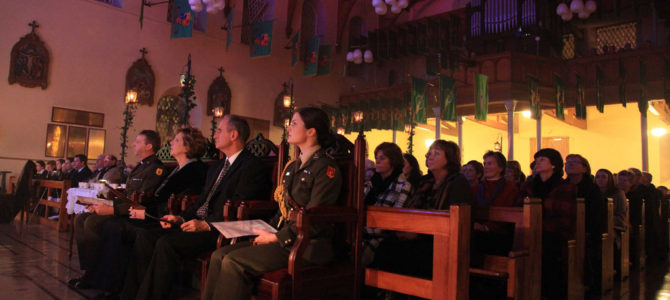
In approaches to Christmas music, many suggest you’re either Buddy the Elf or the Grinch. If the former, then you consider that open Christmas carol season begins the minute you finish the Thanksgiving turkey. If the latter, then you spend the entire holiday season stuffing your fingers in your ears to avoid having to hear anyone who sounds remotely like Alvin and the Chipmunks.
But there’s a third category of people, which is probably the most common: you want to go all-in on Christmas music, but you’ll scream if you have to hear some wailing pop diva moaning about a lost love only tangentially related to Christmas, one more time.
In this season of singing, it can seem like there’s a real dearth of good songs. Rare is the festive ditty that can really call to mind the surprising intervention of a holy God in our real, human world. If you’re desperate for an alternative to the thin musical gruel that Simon malls calls a holiday playlist, then the hymns and carols of Advent offer a remarkable and lovely respite of truth and preparation.
Unleash the Grace of Music
Music, in the church, is often instrumental in pointing our hearts in the proper direction for worship and holy living. The hymns of Advent offer a different and a richer approach to our celebration of Christ’s nativity. In the music of this forgotten church season, the earthly looks heavenward, and begs for the light to dawn. In the subsequent songs of Christmas, the star appears. But will we be ready to see that light if we have not yet practiced the discipline of looking heavenward?
If you’re not from a liturgical Christian background, then the season of Advent may not be familiar to you. In the most basic sense, the term refers to the coming—in Latin, adventus—of Christ to this world as a human baby, laid unceremoniously in a manger in a backwater town. In both Catholic and Protestant tradition, Advent precedes Christmas as the first season of the ecclesiastical year. It encompasses four Sundays, starting in very late November or early December and leading up to Christmas Day.
If the phrase “Advent songs” just doesn’t inspire warm feelings of instant recognition in you, then you’re not alone. But it’s worth making a tour through these underappreciated gems to see what they have to offer to the modern church, particularly because they can enrich our eventual celebration of Christmas.
Ironically, one of the more broadly popular sacred Christmas carols is actually a song of Advent: the great “Veni, Veni Immanuel.” It’s also one of the oldest, traceable to the eighth century. The lyrics are familiar to most people in the church, yet they deserve another look: “O come! O come! Emmanuel! / And ransom captive Israel; / That mourns in lonely exile here, / Until the Son of God appear.”
It’s not subject matter that we typically associate with a holly jolly Christmas. Drawing inspiration from the psalmist and from the prophet Isaiah, here we see Israel—that great nation that prefigures Christ’s church—mourning and lonely, held captive in a foreign land. The chorus, with its insistent call to rejoice, is almost jarring in contrast.
Almost uniquely among modern popular carols, recordings of this hymn often retain the classic character of many Advent tunes: haunting, reserved, and poignant. It is not a song of present Christmas joy, but instead a command to rejoice in spite of darkness and sorrow—exile, even. It is, properly understood, a hymn of sharp contrasts between the here-and-now and the hope that the faithful have in that-which-is-to-come.
Ten centuries later, Englishman Charles Wesley echoed the same theme in these words: “Come, Thou long expected Jesus, born to set Thy people free, / From our fears and sins release us, let us find our rest in Thee: / Israel’s strength and consolation, hope of all the earth Thou art, Dear Desire of every nation, joy of every longing heart.”
Once again, the hymn dwells not on the baby in the manger, nor on shepherds and angels, but on the people of this earth, and it pulls no punches about their “fears and sins,” their need for delivery, rest, and consolation as these people await a Savior to lift them from their mourning. There are a great number of modern versions and harmonies, as well as classic hymn versions, usually set to either a simpler German tune or to the somewhat cheerier Welsh tune Hyfrydol (also used for “Love Divine, All Loves Excelling”).
In both of these, Israel looks forward to the coming of the messiah, even as the church looks forward not only to its annual commemoration of Christ’s incarnation in Bethlehem, but also to the great promise of his second coming and the final redemption of our fallen world. The cry to “Come, thou long expected Jesus!” is both a plea for deliverance and a statement of faith. There is as much pain in it as joy, and perhaps even a mingling of defiance, as the singer looks out on what appears to be reality and avers that his hope, his desire, is not in this world, but in something better and brighter.
A Light in the Darkness
Light and darkness very often figure in the liturgy of Advent. One eighteenth-century Scottish hymn text echoes the Biblical words of Isaiah 9 and Matthew 4: “The people that in darkness sat / A glorious light have seen; / The light has shined on them who long / In shades of death have been.”
Almost contemporaneously, in France another hymn-writer started his approach to Christmas in the same manner that the Gospel of Luke does—with the story of John the Baptist: “On Jordan’s bank the Baptist’s cry / Announces that the Lord is nigh. / Awake and hearken, for he brings / Glad tidings of the King of kings!”
A German carol from the previous century elaborates the same theme. The first verse goes back to the idea of light and darkness, despair and deliverance: “Comfort, Comfort Ye My People, / Speak of peace, so says your God, / Comfort those who sit in darkness, / Groaning under sin’s dread rod.”
https://www.youtube.com/watch?v=z1BeKHq2LIQ
The later verses again recount not herald angels, but John’s preparatory ministry: “Hark, the herald’s voice is crying, / In the desert far and near, / Calling us to true repentance, / For the kingdom now is here.”
The Discipline of Waiting
Most Christians are familiar with a time of repentance and reflection before a high holy day, but we usually call it Lent, not Advent. When we start in on the loud proclamations of joy as soon as the Thanksgiving table is cleared, we deprive ourselves of a historic period of preparation and meditation. The famous 12 days of Christmas—the liturgical Christmas season—come not before Christmas, as modern big-box retailers seem to think, but after it. In the meantime, we wait.
Fundamentally, waiting is a discipline, and it isn’t a common modern accomplishment. In the era of Amazon Prime, we are not used to waiting. Yet Christians are called to be a waiting people. Even after the coming of David’s great seed, the church—new Israel—still awaits the fulfillment of God’s kingdom.
In the New Testament, the Apostle Paul describes all creation groaning as earth waits for her final redemption (Romans 8:23). But though we sometimes wait amidst darkness and groaning, we never wait without hope, and the hymns of Advent do much to magnify this truth.
One of my personal favorites is this jubilant lyric, taken from Psalm 24: 9-10: “Lift up your heads, ye mighty gates, / Behold the King of glory waits, / The King of kings is drawing near, The Savior of the world is here. / Oh, blest the land, the city blest, / Where Christ the ruler is confessed! / Oh, happy hearts and happy homes / To whom this King in triumph comes!”
Advent Grapples with Sorrow and Darkness
As adults, we often have too much on our plates to feel like we’re waiting for Christmas—holiday parties, last-minute work projects, decorations to put up, presents to buy, and family to plan for. We may be longing for Christmas, but we’re rarely waiting for it. Children, however, are always waiting for Christmas, and it’s charming because it is a joyous waiting.
If the accumulated traditions of Lent enforce discipline through denial, then the traditions of Advent are a glorious reversal, even the extra-ecclesiastical ones. Children know this, as they wait wide-eyed for Santa Claus and the unbridled glee of shredding the wrapping paper off piles and piles of Christmas loot.
Instead of forgoing indulgence, even adults can now open a little door to find a chocolate or a trinket or a miniature bottle of booze every day, for 25 glorious calendar days. (Side note: anyone willing to buy the author of this post an Advent calendar focused on whisky, cocktails, or high-end makeup is entitled to immediate lifelong goodwill.)
Yet the hymns of Advent grapple with the reality of darkness, of sorrow, of stress. They deal with a lot fewer singing angels and a lot more dark nights. Yet every last one of them points the singer forward, waiting in hope for comfort, for redemption, for a joy that passes all understanding.
Do we still lose sleep with the joy of waiting for Christmas to come? Do we still take the time to marvel at the miracle of Christ’s birth and incarnation? In the words of a hymn even older than “O Come, O Come,” the true wonder of Christmas and the profound waiting of Advent collide. Writing around the year 397, well before the traditional date given for the fall of the Roman Empire, St. Ambrose phrased it this way: “Savior of the nations, come; / Virgin’s Son, here make Thy home! / Marvel heaven, wonder earth, / That our God chose such a birth.”
In practice Advent serves as an annual reminder that, even as ancient Israel awaited Christ’s first coming, so the new Israel awaits his sure return. Taking the time to revive the songs of Advent puts feet on Ps. 40:3: “And he hath put a new song in my mouth, even praise unto our God: many shall see it, and fear, and shall trust in the LORD.”
Whether you are prone to Grinchiness or to elfin cheer, it is already time for heaven and nature to sing, even while earth still waits to receive her king. So rejoice, rejoice—for Emmanuel shall come to thee, oh Israel.
Update: A reader has put the songs in this list into a YouTube playlist you can access below. Thank you, Mr. Hutchinson!









